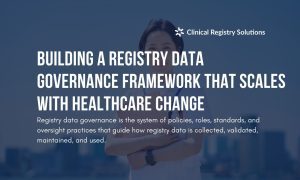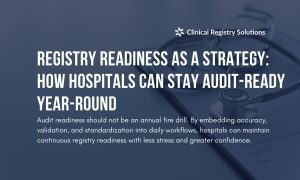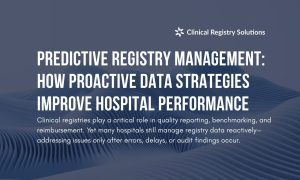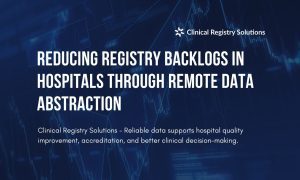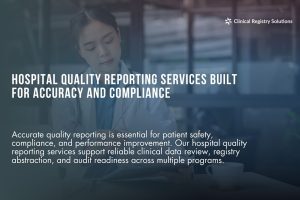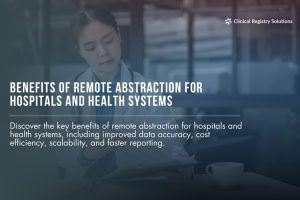Cardiac Data Abstraction
Accurate cardiac data abstraction is essential for hospitals participating in key registries like NCDR (National Cardiovascular Data Registry). Even minor errors can jeopardize compliance, impact hospital reimbursement, and skew quality metrics. In this article, Clinical Registry Solutions outlines the five most common cardiac abstraction mistakes and how to avoid them.
1. Misinterpreting Registry Definitions
Problem: Misunderstanding key terms like AMI or PCI complications causes data entry errors.
Solution:
- Use official NCDR/ACC definitions
- Provide continuous training
- Partner with experts like Clinical Registry Solutions
2. Missing Documentation
Problem: Overlooking key details in clinical records affects data accuracy and CMS scoring.
Solution:
- Cross-check multiple sources (e.g., discharge notes, nursing reports)
- Conduct regular internal audits
3. Incorrect Timing of Events
Problem: Inaccurate timestamps for ED arrival, symptom onset, or PCI balloon inflation can misrepresent performance.
Solution:
- Use standardized workflows
- Leverage digital tools to automate tracking
- Verify timing with clinical teams
4. Skipping Data Validation Before Submission
Problem: Submitting unverified data can lower CMS Star Ratings and VBP scores.
Solution:
- Implement quality control processes
- Use registry-specific software
- Employ third-party validation (e.g., Clinical Registry Solutions services)
5. Falling Behind on Registry Updates
Problem: Outdated definitions or guidelines lead to non-compliant submissions.
Solution:
- Subscribe to registry updates
- Attend abstraction webinars and training
- Work with specialists who stay current on changes
Final Takeaway
Avoiding these common cardiac abstraction errors can greatly improve data quality, regulatory compliance, and reimbursement outcomes. By partnering with experts like Clinical Registry Solutions, hospitals can ensure timely, accurate, and audit-ready submissions to registries like NCDR.
